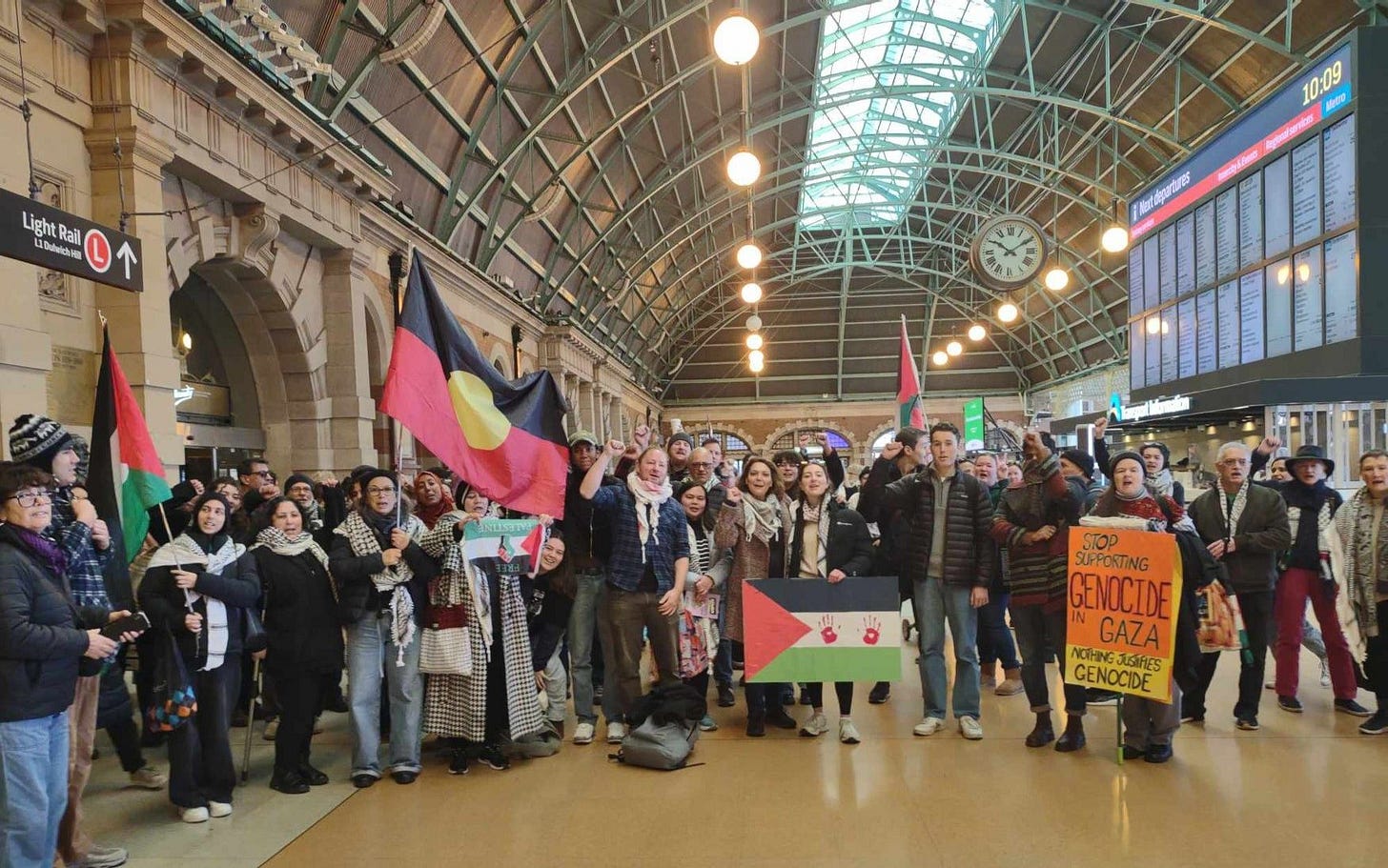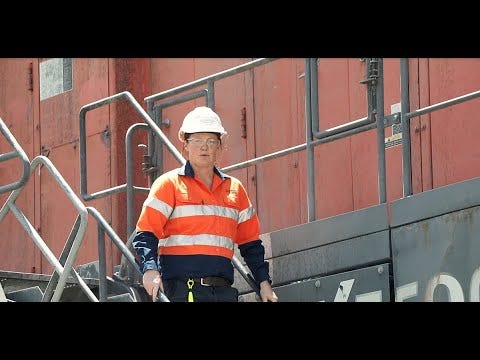NSW Court Bans Pro-Palestinian March to Sydney Opera House, Expands Contempt Powers
This piece is freely available to read. Become a paid subscriber today and help keep Mencari News financially afloat so that we can continue to pay our writers for their insight and expertise.
Today’s Article is brought to you by Empower your podcasting vision with a suite of creative solutions at your fingertips.
Australia’s highest state court issued a prohibition order Thursday blocking a planned pro-Palestinian march to the Sydney Opera House, citing “extreme” public safety risks and establishing new legal precedent that protesters who defy such orders now face contempt of court charges — a significant escalation in the legal consequences for unauthorized demonstrations across New South Wales.
The NSW Court of Appeal’s unanimous ruling against the Palestine Action Group’s planned Sunday rally marks a watershed moment in Australian protest law, with justices declaring the risk to public safety “so significant that it would be irresponsible to allow the public assembly to proceed, irrespective of the political significance of the event and the importance of freedom of political expression.”
Truth matters. Quality journalism costs.
Your subscription to Mencari directly funds the investigative reporting our democracy needs. For less than a coffee per week, you enable our journalists to uncover stories that powerful interests would rather keep hidden. There is no corporate influence involved. No compromises. Just honest journalism when we need it most.
Not ready to be paid subscribe, but appreciate the newsletter ? Grab us a beer or snag the exclusive ad spot at the top of next week's newsletter.
The decision affects an estimated 40,000 demonstrators who planned to gather in Hyde Park before marching to the Opera House forecourt for speeches. Justice Stephen Free, reading the court’s summary, emphasized the judges considered “the likely size of the crowd, the route, the capacity and physical restraints of the destination” in reaching their conclusion.
“The public safety risk to participants and other members of the public is extreme,” Justice Free stated from the bench. “The mitigatory factors advanced by the organisers were not such as to reduce the risk to public safety to an acceptable level.”
The ruling extends beyond simple denial of legal protections for protesters. In a clarification that surprised legal observers and organizers alike, the Court of Appeal explicitly confirmed that attending an assembly subject to a prohibition order constitutes contempt of court — a criminal offense carrying potentially serious penalties.
During oral arguments, lawyers for the Palestine Action Group and Jews Against the Occupation had contended that breaching such an order would not trigger contempt proceedings, citing previous court decisions about rallies. The Court of Appeal rejected this interpretation.
“It would be highly incongruous for the legislature to empower the court to make an order ‘prohibiting’ the holding of a public assembly, if the terms of that order did not accurately reflect the legal consequence of the order,” the judgment read. “The very subject matter of the court’s order will be a proposed public assembly and the subject matter demands clarity, not obscurity.”
The decision means a prohibition order “operates to do precisely what the terms of the order suggest, namely to prohibit the holding of the proposed public assembly,” according to the court’s written reasons.
POLICE CITE CROWD CRUSH FEARS
Assistant Commissioner Peter McKenna testified Wednesday that the planned march had “disaster written all over it,” pointing to the Opera House forecourt’s legal capacity of 6,000 people and limited emergency exit routes.
McKenna expressed skepticism about organizers’ proposals to divide the crowd into smaller processions and disperse groups upon reaching the forecourt. Under cross-examination, he challenged the feasibility of crowd management at the iconic location.
“Your clients, the PAG, have stated the whole point of this is to be at this iconic location, the Opera House,” McKenna told the court. He questioned what might happen if attendees refused to disperse as promised, or if an emergency required rapid evacuation.
The assistant commissioner dismissed suggestions that marshals could prevent overcrowding, stating that “all the altruism in the world” would not help when crowd numbers became “far too excessive to keep people safe.”
Chief Justice Andrew Bell raised the specter of the 1989 Hillsborough disaster in the United Kingdom, where 97 football fans died in a crowd crush.
“Nobody would want a Hillsborough-type tragedy occurring,” Bell said, questioning what might happen if something “went wrong” such as a flare being let off, people panicking, or an ambulance being unable to access the forecourt.
According to police submissions, NSW Police argued there was insufficient evidence of “sufficient planning” for an assembly of the anticipated size. The force also noted that organizers had not contacted Opera House management about their plans for Sunday.
ORGANIZERS DEFEND PROTEST RIGHTS
Barrister Felicity Graham, representing the rally organizers, emphasized that no major event is entirely risk-free and submitted that “timing in politics is critical.”
“Moments at which citizens can seek to exert influence over the politics of the day present themselves and time is crucial,” Graham argued.
The organizers pointed to their track record of compliant, cooperative crowds at previous demonstrations. Graham specifically noted there had not been a crowd crush situation during protests in Australia.
The Palestine Action Group previously organized a march across Sydney Harbour Bridge in August that also faced an unsuccessful legal challenge from state police. That event attracted between 90,000 people according to police estimates and up to 300,000 according to organizers.
Acting Opera House chief executive Jade McKellar testified the venue would treat Sunday’s planned gathering like all large-scale events, likely including security screening for those who entered. McKellar confirmed the Opera House would follow police advice.
The venue operates under its own by-laws prohibiting public demonstrations. Police submissions argued that offenses under those by-laws would not be covered by legal protections normally afforded to participants of authorized assemblies — a point disputed by organizers’ lawyers, who called it an “unjustified burden” on the implied freedom of political communication.
POLITICAL AND LEGAL IMPLICATIONS
NSW Premier Chris Minns welcomed the decision, calling it “the right decision” where “common sense has prevailed.”
“I think it’s very important and very clear from this judgement that that protest should not take place down at the Sydney Opera House,” Minns said at a public event shortly after the ruling. He urged organizers to select an alternative route and work with NSW Police.
Minns noted the Palestine Action Group has organized approximately 100 protests over the past two years, with the “vast majority” proceeding without incident.
Speaking outside the court following the decision, Palestine Action Group representative Damien acknowledged the ruling but emphasized protesters would proceed with a modified plan.
“We will be submitting a Form 1, which has been negotiated with the police, and they have agreed to those particulars,” he said, referring to the official notification form required for public assemblies. “For Sunday, we’ll be demonstrating as detailed — we’ll be marching down George Street to Belmore Park.”
Damien, identified as a lawyer, expressed concern about the contempt-of-court aspect of the judgment, suggesting it would have ramifications beyond the immediate case.
“It doesn’t matter whether your cause is ending the genocide in Gaza or whether it’s protesting against racism or for a pay rise as a union member — this judgement will have very important ramifications for the right to protest in Australia,” he said.
He indicated multiple groups might seek to challenge the decision in the High Court of Australia, the nation’s supreme court.
“Anyone who is concerned about the right to protest in this country has a very strong interest in considering and challenging this judgment,” Damien added.
The protesters maintained their demonstration would proceed Sunday despite the court order, noting they still intended to voice opposition to Israel’s military campaign in Gaza and advocate for policy changes including weapons trade sanctions.
LEGAL PRECEDENT
The Court of Appeal’s clarification on contempt of court represents a significant expansion of potential consequences for protest organizers and participants. Previously, the primary legal risk for attending a prohibited assembly was the loss of immunity from prosecution for certain offenses, including obstructing roads or footpaths.
Under the court’s new interpretation, protesters who knowingly attend a prohibited assembly could face criminal contempt charges — a more serious legal consequence that could include imprisonment.
Legal experts noted this interpretation strengthens the court’s enforcement power but may face constitutional challenges based on the implied freedom of political communication in the Australian Constitution.
The ruling comes as pro-Palestinian demonstrations have occurred regularly across Australia since the outbreak of the Israel-Gaza conflict in October 2023, following Hamas’s attack on Israel that killed approximately 1,200 people and Israel’s retaliatory military campaign that has killed more than 65,000 Palestinians, according to Gazan health authorities.
The Palestine Action Group estimated the Opera House rally would have marked a significant moment in the ongoing protest movement, particularly given the location’s symbolic value and international visibility.
Organizers argued the Opera House venue was crucial to their political message, citing the impact of their Harbour Bridge demonstration that drew national and international attention to their cause.
The court’s decision affirms police authority to prohibit assemblies on public safety grounds, even when such prohibitions may limit political expression, provided the safety risk reaches an “extreme” threshold that makes proceeding “irresponsible.”
Sustaining Mencari Requires Your Support
Independent journalism costs money. Help us continue delivering in-depth investigations and unfiltered commentary on the world's real stories. Your financial contribution enables thorough investigative work and thoughtful analysis, all supported by a dedicated community committed to accuracy and transparency.
Subscribe today to unlock our full archive of investigative reporting and fearless analysis. Subscribing to independent media outlets represents more than just information consumption—it embodies a commitment to factual reporting.
As well as knowing you’re keeping Mencari (Australia) alive, you’ll also get:
Get breaking news AS IT HAPPENS - Gain instant access to our real-time coverage and analysis when major stories break, keeping you ahead of the curve
Unlock our COMPLETE content library - Enjoy unlimited access to every newsletter, podcast episode, and exclusive archive—all seamlessly available in your favorite podcast apps.
Join the conversation that matters - Be part of our vibrant community with full commenting privileges on all content, directly supporting The Evening Post (Australia)
Catch up on some of Mencari’s recent stories:
It only takes a minute to help us investigate fearlessly and expose lies and wrongdoing to hold power accountable. Thanks!








